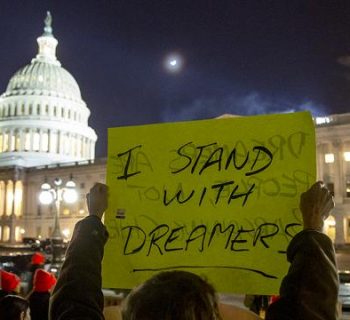By: Caitlin Flynn ~ Teen Vogue ~November 26, 2019
Marlen Ortiz has nightmares — that’s when she’s able to fall asleep. Most nights, she says she stays awake worrying that someone will knock on her door and cart her to Mexico against her will. Now 29, Ortiz came to the United States from Mexico when she was just 12 years old. She’s protected under Deferred Action for Childhood Arrivals (DACA), but with the program at risk, Ortiz not only worries what will happen to her should she be taken back to a country that’s no longer familiar to her, but more so she worries what will happen to her son. That stress doesn’t only weigh on her — according to experts, young people like Ortiz’s son are experiencing mental health impacts as their parents’ futures in the country remain uncertain.
On Tuesday, November 12, the Supreme Court began hearing oral arguments on President Trump’s decision to end DACA, a program put in place by former President Obama in 2012. DACA currently protects nearly 661,000 young immigrants (also referred to as “Dreamers”) who arrived in the United States undocumented prior to their 16th birthdays. The Supreme Court is expected to issue a ruling by the end of June 2020 — but it could come as early as January, according to the National Immigration Law Center.
If the Supreme Court rolls back DACA, the ramifications won’t just affect the program’s recipients, who will be at risk of deportation to countries where many don’t know the culture or speak the language. DACA recipients have built lives, careers, and families in the U.S.; approximately 25% of Dreamers have children who are U.S. citizens — and experts warn that a DACA rollback could put the physical and mental health of as many as 250,000 children at risk of "immediate harm."
Ortiz’s son Jordan has been diagnosed with attention deficit hyperactivity disorder and struggles with impulsivity problems. Ortiz tells Teen Vogue that her son is very aware of the risk that she could be deported and frequently asks questions about what will happen to him if she’s forced to leave the country. Jordan sees both a therapist at school and an outside psychiatrist once a month.
Despite her own severe anxiety, Ortiz stays strong for her son, but he can sense when she’s sad or anxious. At these times, she says that Jordan “doesn’t want to talk to people; he just wants to be near me.” Ortiz has family members in the U.S. who will take care of Jordan if she is forced to return to Mexico, but she emphasizes that it’s a temporary solution and not a sustainable one. Financially and emotionally she is his primary caregiver and it should remain that way. “He’s supposed to be with his parents and his parents are supposed to be taking care of him,” she says. “That’s how the family situation should work and I was told that the U.S. is about keeping families together. Why should my child have to be with someone else if I can provide for him?”
A 2017 study published in Science found that the children of parents protected by DACA experienced lower rates of mental health disorders compared to kids whose parents didn’t have the legal protection. Around the same time as the study’s publication, President Trump announced his plan to end the program and, ever since, DACA recipients and their children have been forced to live with the anxiety and fear of deportation and family separation.
Julie Linton, MD, FAAP, a practicing pediatrician in Greenville, South Carolina and Chair of The American Academy of Pediatrics Council on Immigrant Child and Family Health Executive Committee, tells Teen Vogue that a stable, loving relationship with an adult — typically their parent — plays a critical role in a child’s mental and physical health and well-being.
“It’s really important to remember that the impact of these policies is not only on DACA recipients themselves. It’s on entire families and communities,” Dr. Linton says. “The kids we’re talking about are in our classes, in our neighborhoods, on our sports teams.”
For the children of DACA recipients, the threat of deportation alone is enough to cause significant stress and anxiety. Dr. Linton, who has not treated any of the children or families in this article, has worked with kids who are either worried about being separated from their parents or have already been separated from them. She says physical symptoms like stomach aches, headaches, loss of appetite, trouble sleeping, and, in younger children, bedwetting are common.
Children don’t have to understand the legal details of a DACA rollback to suffer the physical and emotional toll. Dr. Linton tells Teen Vogue that no matter how old a child is, they can sense it when their parents are stressed. “Certainly a three-year-old can’t articulate, ‘I’m scared that my mother will be deported as a result of the termination of DACA,’” Dr. Linton says. “But I can tell you that they will be able to sense that stress and they may manifest it through behavioral changes like tantrums or acting out. They may have regression in speech milestones and toileting, and have eating and sleeping problems.”
Some kids, though, are able to express their fears verbally, which can prove all the more heartbreaking.
Angelica Villalobos, 34, of Oklahoma City has lived in the United States since she was 11 and is a mom of five children ranging in age from 18 months to 19-years-old. Both she and her husband are DACA recipients. Seven years ago, a family member was deported and she and her family helped take care of their children until they were able to return to the U.S.. Her oldest kids vividly remember what happened to their aunt. “It’s always a constant reminder for them that this might happen to us,” she says. Villalobos does her best to make sure her children feel safe and secure; the family has plans in place in case the worst does occur and she’s forced to leave the country. But she notes that you can never truly prepare your children, even as adults, for their parent “to be gone, whether it’s out of this life or to a different country.”
As the current DACA hearing approached, the family talked about it and her kids know that its outcome could have a massive impact on their lives. In the meantime Villalobos ensures that the family maintains their daily routine — but the possibility of a DACA rollback and deportation looms large. When Trump proposed ending birthright citizenship in August, Villalobos recalls that her 11-year-old daughter Crystal expressed that she was excited about the possibility. Villalobos initially thought Crystal didn’t understand what this truly meant and became concerned. “I explained they’d take away her citizenship if that happened,” she tells Teen Vogue. “And her response immediately was, ‘I know. I’ll be undocumented, too, so if they take you away I get to go with you.’ I wanted to cry because I always try to remain calm, but I didn’t realize how badly this whole environment is actually getting to them. When she came out and said that it was so sweet but at the same time it’s so f*cking wrong. It’s so wrong.”
Diana Sanchez, 33, arrived in the U.S. at age 5, just in time to start kindergarten. A resident of Yonkers, she has four children between the ages of 12 months and 14-years-old. She has become an activist for immigration rights, attending rallies across the country, and often bringing her children. She tells Teen Vogue that the last two years have been extremely hard on her family. In addition to the uncertain future of DACA, her own father has been detained by U.S. Immigration and Customs Enforcement (ICE) twice and held at immigration detention facilities. He is currently in detention and Sanchez is fighting for his release. Sanchez says she hasn’t talked with her children at length about the Supreme Court hearing because they already have so much stress in their lives due to their grandfather’s situation. “They’ve just got too much going on in our lives and the last thing I want to do is scare them even more,” she says.
The entire family, including Sanchez’s mother, uses music classes as therapy. When she spoke to Teen Vogue, they were on their way to class at a mariachi academy. “Growing up, mental health was taboo in our community,” she explains. “I’m not really fond of going to a therapist, but I’m working on it. So we decided to take music classes as therapy.” The family activity helps ease some of the stress and provides a fun distraction during a difficult time.
Dr. Linton emphasizes that, as a responsible society, it’s important to know that the medical community has solid research (such as the previously mentioned study published in Science) showing we can protect the health and well-being of these 250,000 kids by keeping DACA in place.
“We’re talking about parents who have nothing other than a dream of the safety and a hopeful future for their child,” Dr. Linton says. “The consequences for hope should never cause harm to a child.”
Source: Caitlin Flynn ~ Teen Vogue ~November 26, 2019







